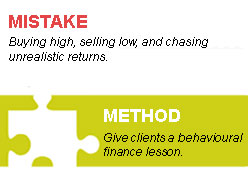
The study of behavioural finance tells us one thing: that investing involves a decision-heavy process riddled emotion, that the outcome is uncertain, and most importantly, that we are absolutely not hardwired to do it well.

New findings in the burgeoning field of Neuroeconomics confirm emotions play a huge role in how people invest. Advisors look for extreme highs and lows in clients’ lives, studies suggest more subtle everyday emotions can also impact investment decisions.
Anchoring is a psychological condition that stems from a person’s upbringing and experiences

Overconfidence can breed a tendency to diversify less and trade more aggressively, which creates challenges if you’re their advisor.
Many of the theories I grew up with—efficient market hypothesis; modern portfolio theory; and the theory that investors always choose the outcome with the greatest reward—were inherently flawed. I have realized markets and people are irrational.

Relying solely on risk-tolerance questionnaires to assess clients is wrong, Tom Idzorek of Morningstar told the New York Consultants Conference, hosted by the Investment Management Consultants Association (IMCA) earlier this week.

Investors can be their own worst enemies. The danger comes from making investment decisions based on emotion, not logic.

Two of the precepts of behavioural finance are overreaction and availability bias. Studies have shown we overreact to newer information, both good and bad.

A higher level of financial preparedness doesn’t necessarily make for a happier retirement. Or so it would seem from the BMO Retirement Institute Report, which found that despite being less financially prepared for retirement, women are more likely to enjoy their retirement than men. The report, titled Divergent Paths To Retirement: How Men And Women […]

Contrary to popular belief, making money is not the goal of investment. Money is a currency that buys emotional gifts. These gifts could be safety, security, freedom or self esteem; unique reasons why people invest money. It is imperative, therefore, that financial advisors address and mitigate clients’ behavioral biases, says Frank Murtha, managing director, Market […]